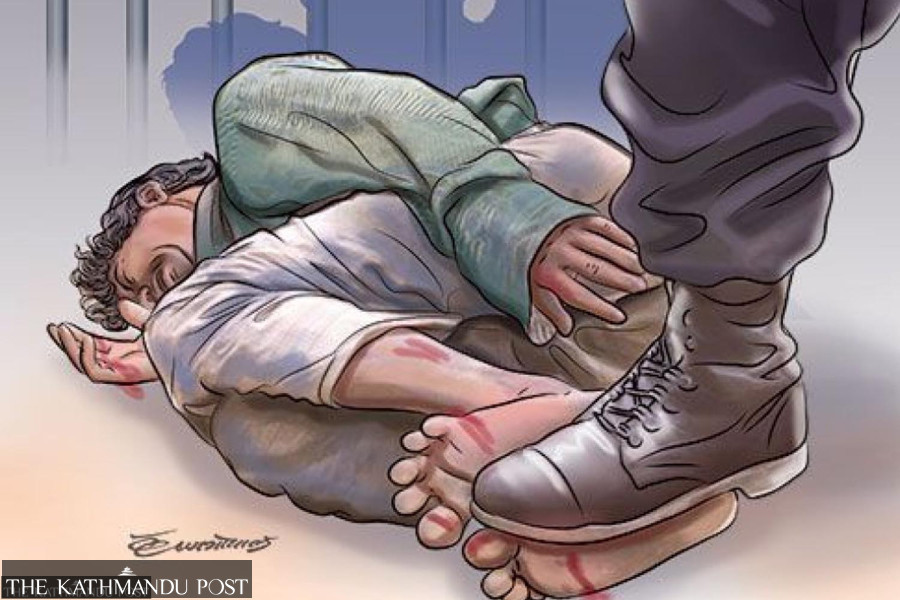National
Nepal fails to enforce anti-torture law
Last year alone human rights commission recommended prosecution in 16 cases. Not a single one implemented.
Binod Ghimire
Even as the incidents of torture continue to increase, not a single conviction has been made under Nepal Penal Code that came into force in 2018.
On June 17, Harisingh Pali, a banking fraud convict, died under mysterious circumstances in Kailali. He was found unconscious in the district jail just a day after his arrest and breathed his last in the Seti Zonal Hospital in course of treatment. Though a sub-inspector has been arrested, following a complaint from the victim’s wife claiming that he died of police torture, rights groups remain skeptical that he will be prosecuted, citing past incidents.
In the last fiscal year, the National Human Rights Commission, after investigating 55 complaints of torture, recommended compensation in 17 cases and action against 16 implicated in torture. However, no criminal prosecution was made against any perpetrator. Records at the Advocacy Forum Nepal show at least 10 incidents of torture were reported in police custodies in 2024. There were 109 such reported cases between 2018 and 2023.
The Constitution of Nepal, 2015, the National Penal Code, 2017, and the United Nations Convention Against Torture (UNCAT), ratified by Nepal, all strictly and absolutely prohibit torture. However, Nepal continues to violate its obligations by failing to effectively prevent torture and other ill-treatment in practice.
Issuing a joint statement on the eve of the International Day in Support of Victims of Torture on Wednesday, Amnesty International Nepal and Advocacy Forum-Nepal expressed their serious concerns over the government’s persistent failure to address these grave abuses. They also urged the authorities to take immediate and concrete action to end the use of torture as a law enforcement tool and ensure accountability for such violations.
“Despite clear legal provisions—including up to five years’ imprisonment for acts of torture—not a single conviction has been witnessed under Nepal’s Penal Code since torture was criminalised in 2017 [the law came into effect after a year],” reads their statement. “This stark gap between law and enforcement reflects a culture of impunity, negligence, and the state’s unwillingness to hold perpetrators accountable.”
Different studies suggest officials implicated in torture and related custodial deaths nearly always evade judicial processes, reinforcing a culture of impunity. Investigations are conducted by police themselves against their fellow officers, raising concerns of conflicts of interest and compromising impartiality and independence, the two human rights organisations said.
They have recommended the government amend the Penal Code to bring it in line with international human rights law and standards, including the removal of the statute of limitations for filing torture-related complaints. The code has a provision of a six-month statutory limit in reporting a case of torture.
They stressed the need for an independent mechanism to monitor and investigate all allegations of torture and custodial deaths, including Pali’s case, which has drawn national attention.
They further called for thorough, impartial, and independent investigations into all allegations of torture and other cruel, inhuman, or degrading treatment, both past and present. Where there is sufficient admissible evidence, the government must ensure prosecution of those suspected of such crimes before competent, independent, and impartial civilian courts in accordance with international fair trial standards.
The rights groups also urged the government to ensure regular and independent monitoring of all detention facilities by both official bodies and civil society representatives. They called for the prompt and full implementation of the NHRC’s recommendations, particularly those related to torture, and the immediate enforcement of pending recommendations involving action against suspected police, prison, and government officials. Compensation to victims must also be prioritised.
The two bodies stressed the importance of compiling and publishing annual, disaggregated statistics on custodial deaths, along with the status of investigations in each case. They urged the government to accede to the Optional Protocol to the Convention against Torture and facilitate a visit to Nepal by the UN Special Rapporteur on Torture and Other Cruel, Inhuman or Degrading Treatment or Punishment.
Addressing longstanding issues from the decade-long armed conflict, the organisations called for truth, justice, and reparations for victims of torture and other serious human rights violations committed between 1996 and 2006. They emphasised the need for support and rehabilitation programmes for survivors and prosecution of those responsible through fair trials in civilian courts without undue delay.




 9.89°C Kathmandu
9.89°C Kathmandu














